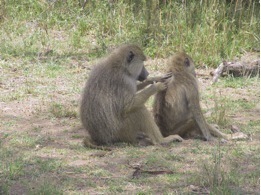
Grooming in non-human primates is mostly known to serve social functions like maintaining social bonds and reducing tension. However, researchers have long suspected that grooming can also reduce parasite loads. We recently published a paper that shows that grooming reduces ectoparasite load in wild baboons. Our results indicate that the main beneficiaries of grooming were younger individuals, females, and high-ranking individuals. Because these individuals received higher rates of grooming, we predict that, all other things being equal, these classes of individuals will generally be in better health, at least with regard to the consequences of ectoparasite infection, than other classes of individuals. Our results provide evidence that individual differences in social behaviour, age and sex may result in differences in vulnerability to tick infestations and potentially parasites that are transmitted by ticks. These findings point to potentially important benefits of group living in primates. Having social partners confers multiple potential advantages including protection from detrimental effects of ticks through grooming.
